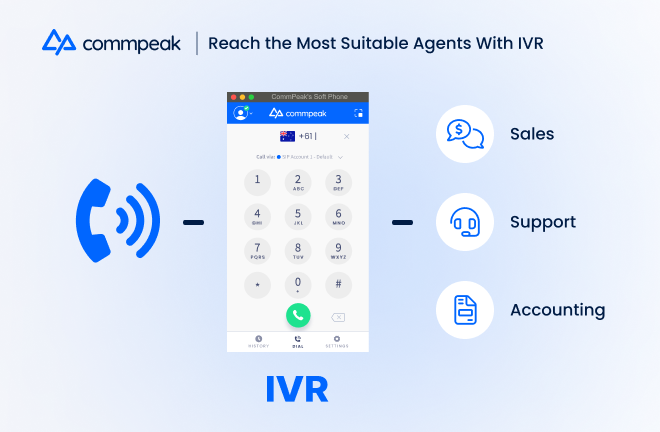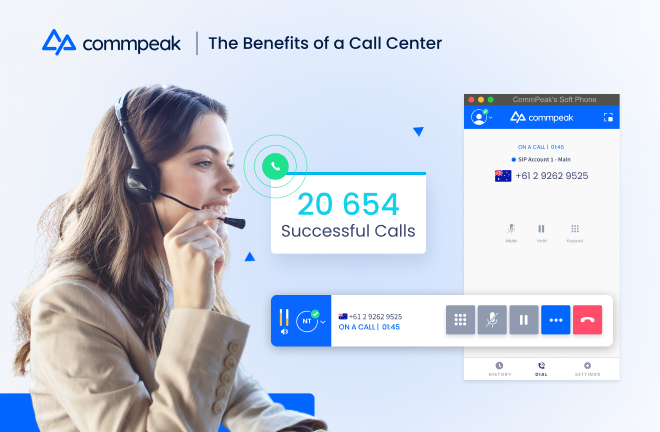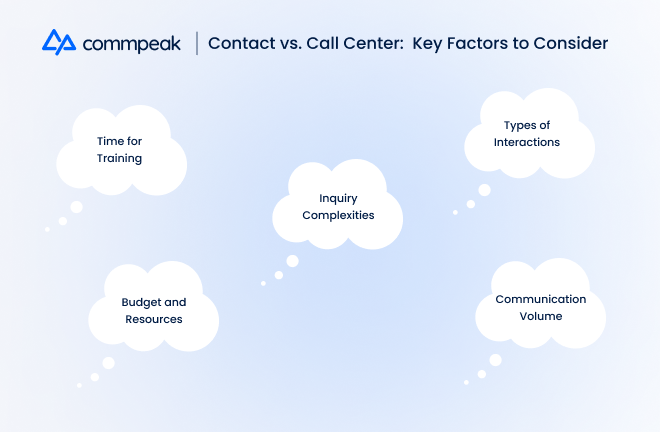When it comes to managing customer interactions, businesses have the choice between equipping themselves with either contact or call center software. Both options allow customer-facing teams to handle incoming inquiries.
However, they differ in the communication channels they support and the exact technologies they use.
Deciding which one to use for your business can take time and effort. Ultimately, the choice boils down to how you plan to initiate lines of communication with your clients and potential customers.

What is a Contact Center?
A contact center is a hub that manages multiple communication channels that customers can use to contact the business. These channels include voice calls, video calls, social media, live web chat, and email. The point is to offer the medium most convenient for the specific client.
The Benefits of a Contact Center
Contact centers are designed to provide an effortless experience for customers and potential leads. Using their favorite communication method, these customers can interact with the business on their terms. These options are great, especially for clients who don’t like talking over the phone.
Contact centers use a variety of technologies to make the communication experience more streamlined. These include interactive voice response (IVR) routes, automatic call distribution (ACD), and customer relationship management (CRM) software.
Each of these technologies helps to ensure that specific inquiries reach the most suitable agents.

Businesses can benefit from a single platform to manage these multiple channels, eliminating the need to constantly switch between different dashboards and interfaces. This type of solution improves response times, decreases wait times, and boosts overall customer satisfaction.
Contact center providers also offer various reporting and analytic tools for their partners. These statistical features can help businesses better understand customer behavior and recognize the area of their operations that need improvement.
The Downsides of a Contact Center
Unfortunately, contact can be more complex and costly than their call center counterparts. Because they support multiple channels, they require more technologies. Each technology not only has its own price but also comes with a unique set of management and maintenance needs.
Moreover, contact centers require a higher level of training for your agents and employees. There are multiple communication channels that all need to be maneuvered consistently. The more your agents need to learn, the more chances there are for disappointing your customers with ill-handled inquiries.
What is a Call Center?
A call center, on the other hand, is a centralized service that manages voice calls exclusively. Call centers were initially created to manage large amounts of incoming calls.
They were particularly useful for large enterprises that needed to handle an enormous amount of tickets. Today, call centers are typically used for sales, customer services, and technical support teams.
Like contact centers, call centers also use technologies like IVR and ACD. Call centers, however, focus more on managing incoming calls and ensuring that those who call are answered in a timely manner.
The Benefits of a Call Center
Call centers are ideal for businesses that want to provide a high-quality voice experience to clients and leads that prefer speaking to a real human.
As opposed to speaking to an automated chat service, human-to-human interaction allows for personalized nuances in the conversation. It also gives costumes a chance to explain their circumstances in more detail.
Call centers are usually much simple and cheaper than contact centers. There are fewer maintenance costs are resources that businesses need to invest in, and they require much less training for agents. This makes call centers an appealing choice for businesses with limited budgets.

The Downsides of a Call Center
But, just like contact centers, call centers also have their limitations. Most obviously, they are limited to voice calls and do not support other communication channels like email or chat. This barrier can become a significant disadvantage for businesses that are trying to keep up with their competitors.
Today’s global market is highly competitive, regardless of which industry you operate in. This means that customers have a wide range of alternatives when it comes to your service. If your company doesn’t offer them the type of support they feel most comfortable working with, it could cost you a client.
Contact Center vs. Call Center: Which Does Your Business Need?
Now that you better understand the difference between contact and call centers, it’s time to explore which one is right for your business. On top of considering the costs and resources each takes up, there are other factors to consider.

1. Types of Customer Interactions
If your business believes it’s better to incorporate a variety of communication channels for your customers, like email, chat, social media, and more, a contact center is likely the best option.
A unified contact center platform will allow you to manage these various interaction methods easily. Moreover, it will be simpler to offer a consistent experience across mediums.
2. Volume of Customer Interactions
How many calls does your business typically receive in a day? If it’s a high volume, then a call center may be your better choice. Modern call center solutions can handle up to hundreds of simultaneous calls, ensuring your customers can always connect to an agent.
Moreover, call center providers, like CommPeak, offer intelligent analytical tools that can help you optimize your communications to produce better results.
3. Potential Complexity of Inquiries
The type of solutions you choose also depends directly on how complex your customers’ questions and concerns can get. For example, you may want to offer an automated chat service for simpler inquiries while reserving human-to-human calls for more complicated issues.
Contact centers provide wide access to resources and technologies while also ensuring your resources are leveraged to their fullest potential.
4. Budgeting and Resource Limits
Contact centers are way more expensive to set up and manage than call centers. They have more capabilities, and therefore vendors charge more than they would if they only equipped your business with call services.
A call center is probably a more viable option if cost and budget restraints are significant factors for your operations.
But remember, just because a call center is cheaper doesn’t mean that it’s less effective!
5. Time Allotted for Agent Training
Contact centers require more training for your agents. Instead of focusing on one dedicated voice channel, your agents will have to provide a consistently excellent experience across all mediums.
You’ll have to dedicate more time and resources to ensuring your new employees are experts on multiple fronts rather than simply voice support.
Contact Center vs. Call Center: Making Your Choice
Ultimately, deciding between a contact center and a call center will depend on your business’s specific needs and resources. However, it’s important to consider both options carefully before coming to a final conclusion.
Selecting the correct kind of center can substantially affect your customer experience. This can aid you in enhancing your overall business performance and reputation.
Contact centers provide more comprehensive and personalized experiences across multiple channels. But with a call center, your business can focus exclusively on giving top-quality voice services for a large number of incoming calls.
When choosing between the two, consider your business’s specific needs and requirements. Analyze the costs and benefits of each option and make your pros and cons list. The right type of communication center can guarantee superior customer experience and help you distinguish yourself from competitors.
CommPeak’s Communication Tools for Business
Regardless of if your business chooses to implement a call or contact center, CommPeak can supply you with reliable calling routes. CommPeak is a well know cloud contact center solutions provider, and we can also provide your business with advanced features that can optimize your customer services.
With CommPeak, you can easily manage multiple communication channels, access real-time analytics and reporting, and streamline your customer support operations. Contact CommPeak today to learn more about how our solutions can help your business thrive.


